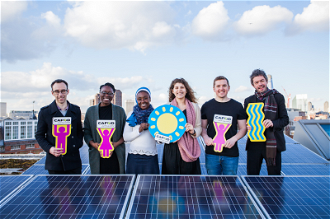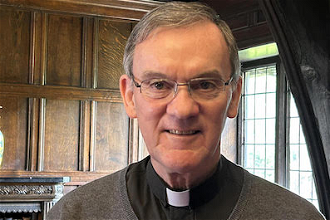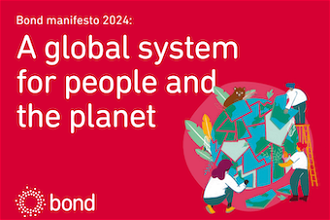Historic government report calls for UK 'net zero' emissions target

CAFOD staff and volunteers next to solar panels on roof of CAFOD's office. Image: Thom Flint/CAFOD
Ministers must set a more ambitious target for halting climate change, according to a report from the government's climate advisers.
The Committee on Climate Change report says the government should set a target of reducing the UK's emissions of greenhouse gases to 'net zero' by 2050.
Greenhouse gases such as carbon dioxide are driving global temperature rises and making storms, floods and heatwaves more frequent and severe, hitting poor communities.
A net zero target would mean that emissions from cars, planes, buildings and farms would have to be reduced and not exceed the amount that could be removed from the air through measures such as tree-planting.
A 'step closer' to avoiding disaster for world's poorest
The recommendation comes after the UN's science body, the Intergovernmental Panel on Climate Change, found that all countries must bring emissions down to zero by mid-century to avoid global temperatures rising 1.5C above levels seen before the industrial age.
Neil Thorns, Director of Advocacy at Catholic aid agency CAFOD, noted that allowing temperatures to exceed this level would jeopardise food and water supplies for hundreds of millions of people.
Warming above 1.5C would also increase the risk of devastating storms and floods like the cyclones which have hit Mozambique in recent weeks and lead to more frequent extreme heatwaves like that experienced in the UK and around the world last summer.
Thorns said: "The Committee's report brings us a step closer to the net zero target we need if we're to avoid temperature rises exceeding the 1.5C level which will spell disaster for the world's poorest communities.
"Now it's up to the government to respond to the voices of voters up and down the country who expect ministers to urgently put the target in legislation and make it a reality with the benefits this will bring to our economy, our health and our homes.
"It's also critical the government sets a target which is honest and transparent instead of relying on offsetting or outsourcing our emissions to other countries."
Climate target needs updating
The government is currently required by law to ensure emissions are 80 per cent lower by 2050 than they were in 1990.
This target was set in 2008 by Parliament in the Climate Change Act, a law which was regarded as world-leading at the time but which many argue needs to be made more ambitious in light of the latest science.
Scientists now say that emissions must be reduced further and more quickly than the goal set by the 2008 Act in order to keep temperature rises below the dangerous 1.5C threshold which world leaders committed to meet in the Paris Agreement.
The cost of solar and wind power has also plummeted faster than was anticipated in 2008, with renewable energy generating one-third of the UK's electricity last year.
How can we reduce emissions to net zero?
Cutting emissions to zero will require generating more electricity from renewable energy, moving from petrol and diesel cars to electric vehicles and better-insulating homes.
Tree-planting and reducing flying and meat consumption will also be needed.
As well as helping to avoid dangerous temperature rises, this will lead to cleaner air, make homes warmer and help to create jobs.
Bishop John Arnold, lead bishop on environmental issues for the Catholic Church in England and Wales, said: "This is an ambitious target which will be welcomed by the thousands of Catholics in this country who have responded to Pope Francis's call for us to protect our common home.
"In achieving this target, we must all play our part, and I'm proud that the Catholic community has taken a leading role in showing what can be achieved. Thousands of our churches are running on renewable energy and schools and parishes in dioceses around the country have committed to living simply and sustainably.
"We look forward to seeing the government embracing its role in delivering this agenda urgently and enthusiastically. Pope Francis has asked why any leader would want 'to be remembered for the inability to take action when it was urgent and necessary to do so'. Those who think that this is an issue which can be left for another day should ask themselves this question.
"The report represents a welcome recognition that as a country we must be a good 'global' neighbour and must think about the millions of our brothers and sisters around the world who already face danger and suffering, and the millions more who will increasingly be affected by climate change."
International Catholic support for UK leadership on climate
Archbishop Peter Loy Chong from the Archdiocese of Suva in Fiji - a country vulnerable to climate change - said he welcomed "the international leadership shown by the Committee on Climate Change with these recommendations."
The Archbishop said: "With its historic emissions and size of its economy, this is a hugely important global step by the UK and one I hope similar countries will replicate."
Neil Thorns from CAFOD added: "The government has the opportunity to lead the world by presenting a serious and credible roadmap for how a major industrialised economy can play its part in halting climate change, but it needs to do this in the coming months. It mustn't delay."
Tell the government #TheTimeIsNow for an ambitious net zero target at a mass meeting of MPs and constituents on 26 June at cafod.org.uk/climatelobby
CAFOD has been campaigning for action on environmental damage and climate change since 1989, with tens of thousands of Catholics in England and Wales supporting our campaigns over the years. Examples of action taken by the Catholic community, particularly following Pope Francis's 2015 encyclical on environment and development Laudato Si', include:
Thousands of churches in nearly every Catholic diocese in England and Wales have switched to renewable energy suppliers
Tens of thousands of CAFOD supporters signed petitions, took part in marches or even cycled and walked to Paris ahead of COP21
30,000 people wrote to the UK's World Bank representative to call on the Bank to provide off-grid renewable energy access to energy-poor communities.
Dozens of churches and schools have committed to 'live simply' and sustainably in solidarity with communities affected by climate change
Primary school children wrote letters to Pope Francis on how they've responded to Laudato Si' which were handed to the Pope last summer.
CAFOD is the official aid agency of the Catholic Church in England and Wales, and part of Caritas International. Across the word, we bring hope and compassion to poor communities, standing side by side with them to end poverty and injustice. Because we work through the local Church, we can reach people and places that others can't.





















